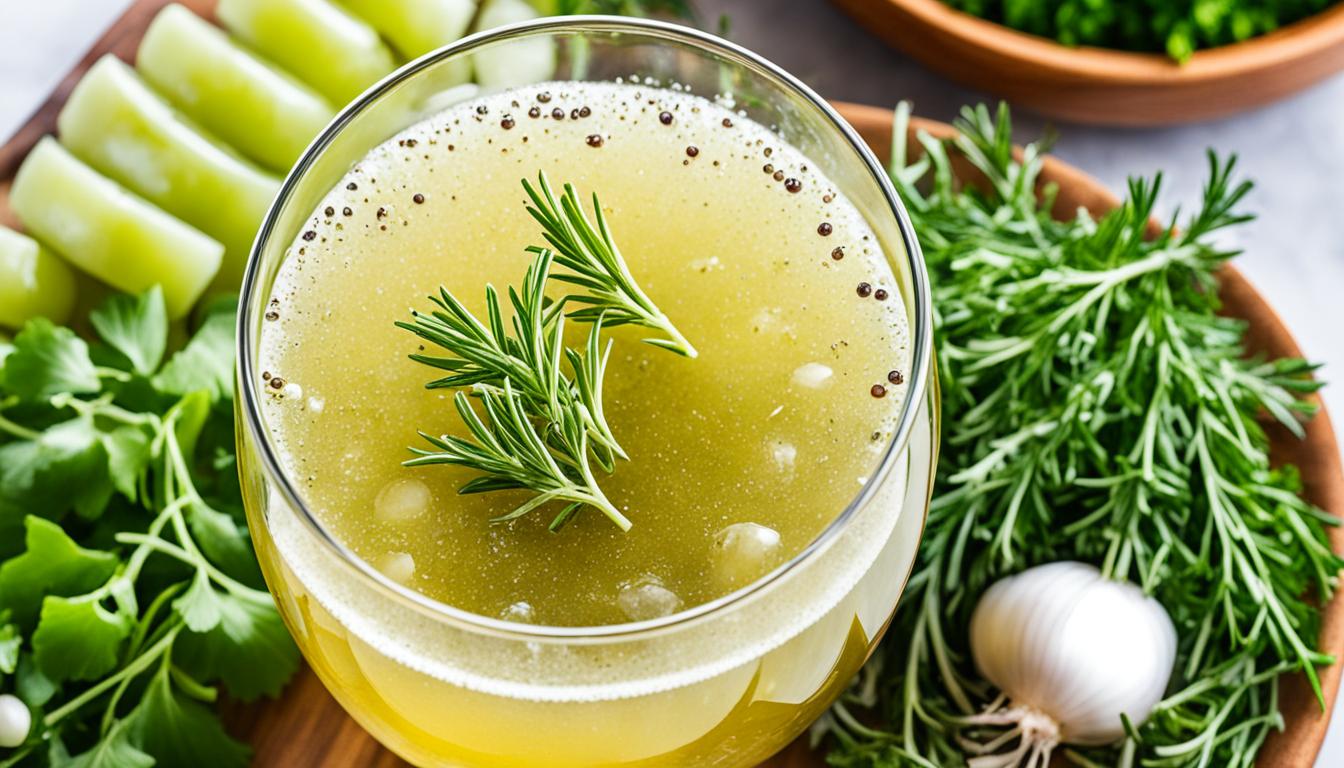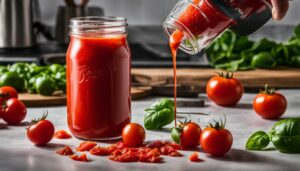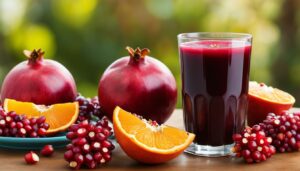Originally posted on March 26, 2024 @ 7:56 pm
When following a recipe that calls for a splash of dry white wine, have you ever found yourself wondering if there are any suitable substitutes available? Is it possible to achieve the same depth of flavor and culinary magic without using wine? If these questions have piqued your curiosity, then you’re in for a treat! In this article, we will explore a range of alternatives to dry white wine that will not only surprise you but also expand your culinary repertoire.
Contents
- 1 Vinegar as a Substitute for Dry White Wine
- 2 Lemon Juice as a Substitute for Dry White Wine
- 3 Fortified Wines as Substitutes for Dry White Wine
- 4 Broth as a Substitute for Dry White Wine
- 5 Water as a Substitute for Dry White Wine
- 6 Importance of White Wine in Cooking
- 7 Non-Alcoholic Substitutes for White Wine
- 8 Using Substitutes in Recipes
- 9 Conclusion
- 10 FAQ
- 10.1 Can I substitute vinegar for dry white wine in recipes?
- 10.2 How can I use lemon juice as a substitute for dry white wine?
- 10.3 Can fortified wines be used as substitutes for dry white wine?
- 10.4 Can I use broth as a substitute for dry white wine in cooking?
- 10.5 Is water a suitable substitute for dry white wine in recipes?
- 10.6 Why is white wine important in cooking?
- 10.7 What are some non-alcoholic substitutes for white wine?
- 10.8 How do I use substitutes for white wine in recipes?
- 10.9 What are the best substitutes for dry white wine in recipes?
- 11 Source Links
Key Takeaways:
- When a recipe calls for dry white wine, you can use various substitutes such as vinegar, lemon juice, fortified wines, broth, and even water.
- Each substitute brings its own unique flavors and acidity levels, allowing you to tailor your dishes to suit your preferences.
- Experimenting with these substitutes can help you unlock a world of culinary creativity and discover new flavors.
- Be sure to taste your dishes as you go and adjust the flavors accordingly to achieve the desired balance.
- Whether you prefer non-alcoholic options or need a substitute in a pinch, there are plenty of alternatives to choose from.
Vinegar as a Substitute for Dry White Wine
If you find yourself in need of a substitute for dry white wine in your recipes, vinegar is a versatile option to consider. Vinegar, such as white wine vinegar, rice vinegar, or apple cider vinegar, can bring a similar depth of flavor to your dishes. These acidic liquids with sugar notes work well as a white wine substitute, particularly in recipes that require the acidity to balance flavors.
When using vinegar as a substitute, it is important to choose the right type. Harsh vinegars like distilled white vinegar can add excessive acidity, which may overpower the dish. Opt for milder varieties like white wine vinegar, rice vinegar, or apple cider vinegar for a balanced flavor profile. These vinegars can provide the desired tanginess without overpowering the other ingredients.
The general ratio for substituting vinegar for white wine is 1/2 cup of vinegar mixed with 1/2 cup of water per 1 cup of white wine. This diluted mixture helps replicate the volume and flavor of the original ingredient while maintaining the necessary acidity. It is essential to note that the flavor of vinegar can be strong, so start with a smaller quantity and adjust according to your taste preferences.
“Vinegar, such as white wine vinegar, rice vinegar, or apple cider vinegar, can bring a similar depth of flavor to your dishes.”
Whether you’re making a savory sauce, salad dressing, or marinade, vinegar can serve as a reliable substitute for dry white wine. Its acidic nature adds brightness and complexity to the dish, elevating the overall flavor profile. Next time you find yourself without dry white wine, reach for a bottle of vinegar and embrace the exciting possibilities it brings to your cooking.
Pros and Cons of Using Vinegar as a Substitute for Dry White Wine
| Pros | Cons |
|---|---|
| Provides acidity and tanginess | Flavor can be overpowering if not used in moderation |
| Brings depth and complexity to dishes | May not perfectly mimic the flavor of dry white wine |
| Offers a wide range of vinegar options to suit different recipes | Requires dilution with water to achieve the desired balance |
Lemon Juice as a Substitute for Dry White Wine
When it comes to finding a substitute for dry white wine in recipes, lemon juice is an excellent option. While lemon juice has a higher acidity level than white wine, it can still provide a similar flavor profile when used in the right proportions.
One important thing to note is that lemon juice is more acidic than white wine. To adjust for this, you can use half or less of the amount of lemon juice compared to the wine called for in the recipe. Then, make up the rest of the liquid by adding water. This will help balance out the acidity and avoid overpowering the other flavors in the dish.
The general ratio for substituting lemon juice for white wine is 1/4 cup of lemon juice mixed with 3/4 cup of water per 1 cup of white wine. This provides a good balance of acidity and flavor, allowing you to achieve a delicious result in your cooking.
When using lemon juice as a substitute, it’s important to taste the dish as you go and adjust the acidity and flavors to your liking. You may find that you need to add a bit more lemon juice or water depending on the specific recipe and your taste preferences.
“Lemon juice adds a bright, tangy flavor to dishes, making it a great substitute for dry white wine in recipes.”
Benefits of Using Lemon Juice as a Substitute
- Provides acidity: Lemon juice brings a tangy acidity to dishes, similar to what dry white wine offers.
- Brightens flavors: The citrusy notes of lemon juice can help enhance the overall flavors of a dish.
- Easy to find: Lemon juice is readily available in most kitchens, making it a convenient substitute for white wine.
- Creates a lighter dish: If you’re looking to reduce the alcohol content or create a lighter dish, lemon juice is a great alternative to white wine.
Fortified Wines as Substitutes for Dry White Wine
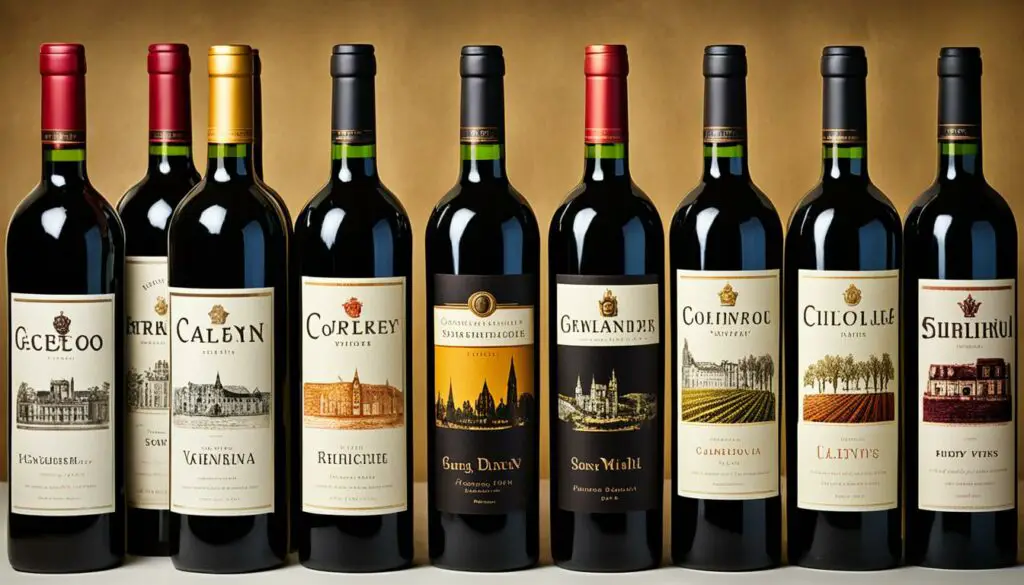
When it comes to finding a substitute for dry white wine in your recipes, fortified wines offer a great alternative. With their similar alcohol content and flavor profiles, fortified wines like brandy, marsala, and madeira can effectively replace dry white wine in cooking. These fortified wines provide a depth of flavor that complements a variety of dishes.
However, it’s important to note that not all fortified wines are suitable substitutes for dry white wine. Red wines like port should be avoided, as they can significantly alter the taste and color of your dish. Instead, opt for dry vermouth, another fortified wine that offers a complexity of flavor notes and botanicals. Dry vermouth can enhance the taste of your recipe without overpowering it.
On the other hand, it’s crucial to avoid substituting white wine with spirits like bourbon, whiskey, rum, or tequila. These spirits can introduce strong and undesirable flavors into your dish.
To ensure a successful substitution, the general ratio for substituting fortified wine for white wine is 1 cup of fortified wine per 1 cup of white wine. This ensures that you maintain the desired flavor balance in your recipe.
Here’s a comparison of different fortified wines that can be used as substitutes for dry white wine:
| Fortified Wine | Flavor Profile | Best Used In |
|---|---|---|
| Brandy | Rich, fruity, and slightly sweet | Marinades, sauces, and dessert recipes |
| Marsala | Rich, nutty, and caramel-like | Chicken or veal dishes, creamy sauces, and desserts |
| Madeira | Rich, caramelized, and smoky | Sauces, soups, stews, and desserts |
| Dry Vermouth | Herbal, aromatic, and slightly sweet | Seafood dishes, sauces, and cocktails |
By substituting with fortified wines, you can bring unique flavors and complexities to your recipes, making them just as delightful as when you use dry white wine.
Broth as a Substitute for Dry White Wine
Chicken or vegetable broth is a great substitute for dry white wine in recipes. Not only does it add liquid to the dish, but it also imparts a flavorful base to your cooking. While broth lacks the acidity of white wine, there are ways to compensate for this and achieve a well-rounded flavor profile.
One approach is to add a dash of vinegar or lemon juice right before serving the dish. This will help brighten the flavors and provide a hint of acidity that is reminiscent of white wine. Alternatively, you can also use a combination of broth and vinegar/lemon juice during the cooking process, adjusting the quantities to taste.
It is worth noting that when using broth as a substitute, it is recommended to opt for low-sodium or no-sodium varieties. This allows you to have better control over the salt content of your dish, especially if the original recipe called for a dry white wine with a higher sodium content.
Tips for Substituting Broth for White Wine
Here are some general guidelines to follow when substituting broth for dry white wine:
- Use a 1:1 ratio of broth to white wine. For example, if the recipe calls for 1 cup of white wine, replace it with 1 cup of broth.
- Adjust the acidity levels by adding a small amount of vinegar or lemon juice in the final stages of cooking or right before serving.
- Choose low-sodium or no-sodium broth to have more control over the salt content of your dish.
By following these tips, you can successfully incorporate broth as a substitute for dry white wine in your recipes, while still achieving delicious and flavorful results.
| Pros | Cons |
|---|---|
| • Adds liquid and flavor to the dish | • Lacks the acidity of white wine |
| • Can be easily adjusted to taste | • May require additional seasonings to compensate for the lack of acidity |
| • Low-sodium or no-sodium options available |
Incorporating broth as a substitute for dry white wine in cooking provides a viable option for those who prefer not to use alcohol or who simply don’t have white wine on hand. With the right adjustments and a little experimentation, you can create flavorful dishes that are just as satisfying as those made with white wine.
Water as a Substitute for Dry White Wine
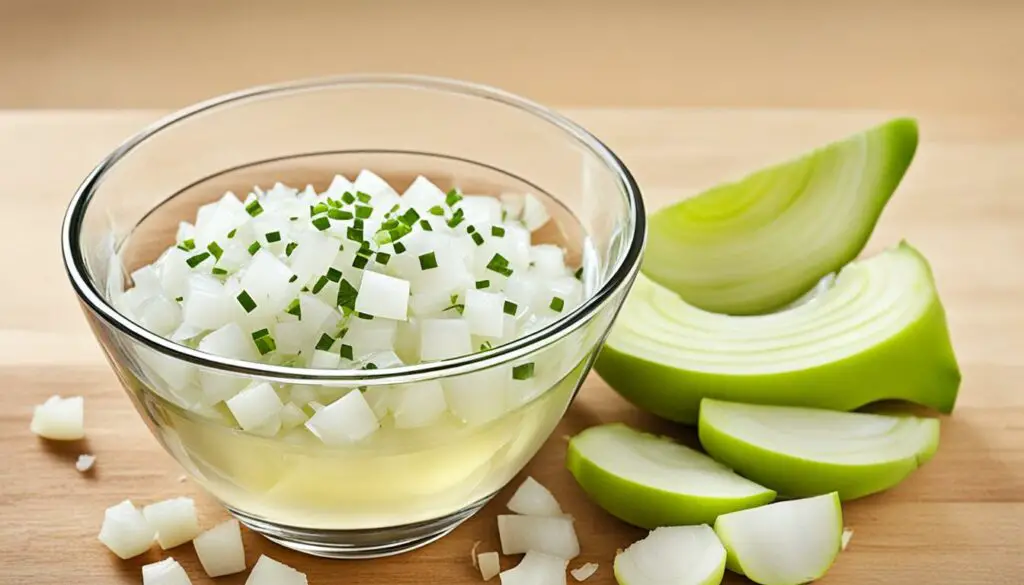
When you need a liquid substitute for dry white wine in recipes that do not require the wine to be reduced, water can be a suitable option. However, it’s important to note that water lacks the acidity and flavor profile of white wine, so it may affect the overall taste of the dish.
To enhance the flavors when using water as a substitute, you can add a splash of vinegar or lemon juice before serving. This will help bring some acidity to the dish and brighten the flavors. It’s recommended to use a small amount of vinegar or lemon juice, as you don’t want to overpower the other ingredients.
Here is a general ratio for substituting water for white wine:
| Dry White Wine | Water |
|---|---|
| 1 cup | 1 cup |
Remember, this substitution is best for recipes where the white wine is used primarily for its liquid content and not for its flavor or acidity. Experiment with different ratios and taste the dish as you go to ensure the desired flavors are achieved. Don’t be afraid to add additional ingredients or seasonings to compensate for any flavor loss.
Importance of White Wine in Cooking
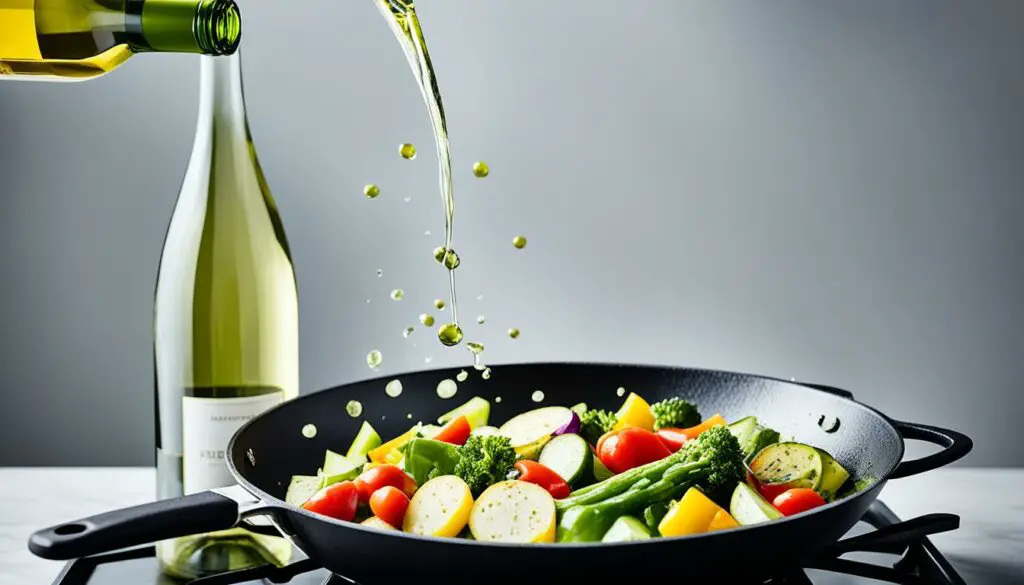
White wine plays a crucial role in cooking as it enhances flavors, adds acidity, and unlocks the full potential of various dishes. It’s a versatile ingredient that can elevate the taste and complexity of your recipes. When used in moderation, white wine brings unique characteristics that cannot be replicated with other ingredients.
One of the main benefits of cooking with dry white wine is its ability to balance rich and creamy dishes. The acidity in the wine cuts through the richness of dishes like cream-based sauces, adding a refreshing and vibrant touch. It brings a delightful tanginess that prevents the dish from becoming too heavy or overpowering.
In addition to balancing flavors, white wine acts as a meat tenderizer in marinades. The natural acidity in the wine helps break down proteins, resulting in tender and juicy meat. Whether you’re marinating chicken breasts or pork chops, adding white wine to the marinade can make a substantial difference in the texture and taste of the final dish.
When it comes to pan sauces and deglazing, white wine is a valuable ally. After searing proteins like chicken or fish, deglazing the pan with white wine helps lift all those browned bits that add depth and complexity to the sauce. The alcohol in the wine also helps to enhance the flavors of the ingredients, creating a well-rounded and harmonious taste.
White wine is not just a flavor enhancer – it can be the star of the show in many recipes. From classic Coq au Vin to delicate seafood dishes, the unique flavors of white wine can bring complexity and sophistication to your cooking. It adds subtle fruity and floral notes, creating a depth of flavor that elevates your dish to new heights.
“White wine brings a delightful tanginess that prevents the dish from becoming too heavy or overpowering.”
However, if you prefer not to use alcohol or simply don’t have white wine on hand, don’t worry! There are plenty of substitutes available that can provide similar results. From vinegar and lemon juice to broth and water, these alternatives can help you achieve the desired flavors and balance in your recipes.
But before we delve into substitutes, let’s take a moment to appreciate the various types of white wine and their unique characteristics.
Types of White Wine
| Type of White Wine | Taste Profile | Food Pairings |
|---|---|---|
| Chardonnay | Buttery, oak-aged, hints of vanilla and tropical fruit | Butter-basted fish, roasted chicken, creamy pasta dishes |
| Sauvignon Blanc | Crisp, herbaceous, with notes of grapefruit and green apple | Grilled vegetables, goat cheese salad, seafood |
| Riesling | Off-dry, floral, with flavors of peach and honey | Spicy Asian cuisine, roasted pork, apple desserts |
| Pinot Grigio | Light-bodied, refreshing, with citrus and green apple notes | Light seafood dishes, fresh salads, antipasti platters |
The diversity of white wines opens up a world of possibilities in the kitchen. Each type offers distinct flavors that can enhance specific dishes. So, the next time you’re in the wine aisle, consider adding a bottle of white wine to your cart, as it can be an invaluable ingredient in your culinary adventures.
Non-Alcoholic Substitutes for White Wine
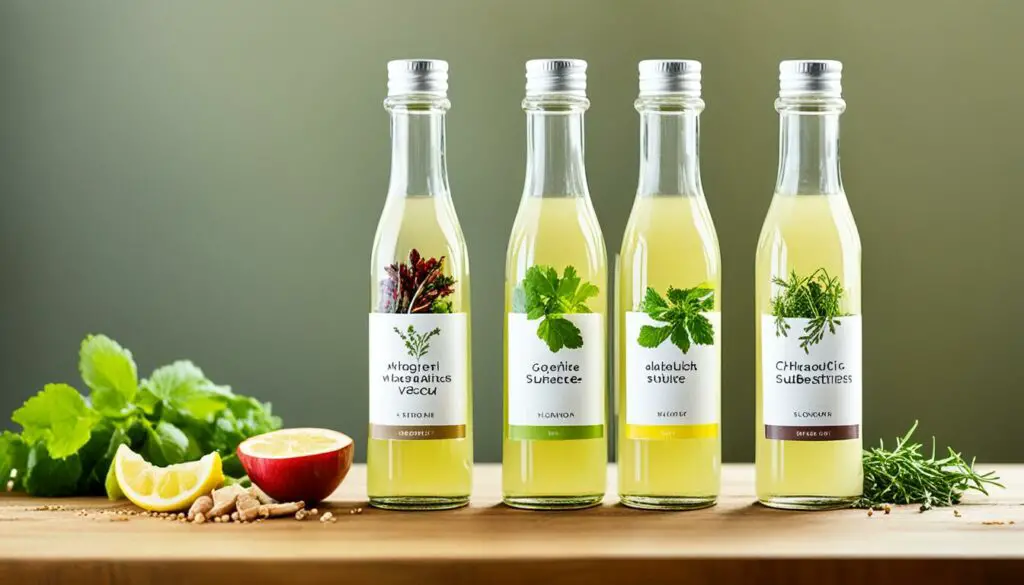
If you prefer not to use alcohol in your cooking, there are several non-alcoholic substitutes for white wine. These options provide similar flavors and acidity levels to white wine, allowing you to create delicious dishes without the use of alcohol.
- Non-alcoholic wine: Choose non-alcoholic versions of white wine, which are made by removing the alcohol content while retaining the flavor profile. These options closely mimic the taste of white wine and are readily available in many stores.
- Chicken broth: This savory substitute adds depth of flavor to your dishes and can be used in recipes that call for white wine in sauces, stews, and braises. It provides a rich and aromatic base for your cooking.
- Apple cider vinegar: With its slightly acidic and fruity notes, apple cider vinegar can be used as a substitute for white wine in various recipes. It adds a tangy flavor that complements many dishes.
- Lemon juice: The acidity and citrusy notes of lemon juice make it an excellent alternative to white wine. It works particularly well in seafood dishes, marinades, and vinaigrettes.
- White grape juice: This sweet and fruity juice can be used as a non-alcoholic substitute for white wine. It provides a similar level of sweetness and flavor complexity to enhance your recipes.
- White wine vinegar: Made from fermenting white wine, white wine vinegar can be a suitable replacement for white wine. It offers the same acidic profile, but use it in moderation as it can be stronger in flavor.
- Ginger ale: For recipes that require the bubbly and slightly sweet characteristics of white wine, ginger ale can be used as a substitute. Its effervescence adds a pleasant texture and flavor to your dishes.
- Rice wine vinegar: Commonly used in Asian cuisine, rice wine vinegar can also be used as a non-alcoholic substitute for white wine. It provides a mild and slightly sweet taste to your recipes.
Experiment with these non-alcoholic substitutes to find the ones that best complement your cooking style and individual preferences. Whether you’re avoiding alcohol or simply don’t have white wine on hand, these alternatives offer delicious options for enhancing the flavors of your dishes.
Using Substitutes in Recipes
When it comes to cooking with substitutes for white wine, it’s essential to consider the flavor profiles and acidity levels of the alternatives. Here are a few tips to help you navigate using substitutes in your recipes:
Taste and Adjust
As you incorporate substitutes into your recipe, be sure to taste the dish as you go. This will give you the opportunity to adjust the flavors accordingly. Keep in mind that each substitute will bring its own unique taste, so it’s important to find the right balance to complement your dish.
Mindful Measurements
The quantity of white wine required in a recipe can influence the taste and moisture levels. When using substitutes, be mindful of the measurements to maintain the desired balance of flavors in your dishes. Follow the recommended ratios for each substitute to ensure the best results.
Experiment and Discover
Don’t be afraid to experiment with different substitutes in your recipes. Cooking is an art, and using substitutes allows for creativity and exploration. Discover new flavors and combinations that work best for your taste preferences and the specific dish you’re preparing.
Remember to keep an open mind and have fun exploring the world of cooking with substitutes. There are endless possibilities to create delicious dishes while accommodating dietary preferences or ingredient availability.
| Tip | Takeaway |
|---|---|
| 1. | Taste the dish as you go and adjust the flavors accordingly. |
| 2. | Follow the recommended ratios for each substitute to maintain the desired balance of flavors. |
| 3. | Experiment with different substitutes to discover new flavors and combinations. |
With these tips in mind, you’ll be able to confidently cook with substitutes and create tasty dishes that suit your preferences and dietary needs.
Conclusion
In conclusion, when a recipe calls for dry white wine and you don’t have any or prefer not to use alcohol, there are various substitutes available. Vinegar, lemon juice, fortified wines, broth, water, and non-alcoholic options like non-alcoholic wine and grape juice can all be used as substitutes for dry white wine in recipes. Each substitute provides its own unique flavors and acidity levels, allowing you to create delicious dishes without compromising taste.
Experiment with these substitutes and find the ones that work best for your individual preferences and recipes. Whether you choose to use vinegar for its acidic notes, lemon juice for its refreshing tang, fortified wines for their depth of flavor, broth for its savory richness, water for a neutral base, or non-alcoholic options for a completely alcohol-free alternative, you can confidently substitute dry white wine in your recipes and achieve flavorful results.
Remember to taste your dish as you go, adjusting the flavors accordingly, and be mindful of the quantities when using substitutes. Following the recommended ratios for each substitute will help maintain the desired balance of flavors in your dishes. So the next time you’re in the kitchen and a recipe calls for dry white wine, don’t worry if you’re all out. You have plenty of options to choose from, ensuring that your dishes still turn out delicious and satisfying.
FAQ
Can I substitute vinegar for dry white wine in recipes?
Yes, vinegar can be used as a substitute for dry white wine in recipes. Acidic vinegars like white wine vinegar, rice vinegar, or apple cider vinegar work well to provide a similar depth of flavor. It is important to avoid harsh vinegars like distilled white vinegar. The general ratio for substituting vinegar for white wine is 1/2 cup of vinegar mixed with 1/2 cup of water per 1 cup of white wine.
How can I use lemon juice as a substitute for dry white wine?
Lemon juice is another excellent substitute for dry white wine in recipes. While lemon juice is more acidic than wine, you can adjust the amount used by using half or less of the swap and making up the rest of the liquid with water. The general ratio for substituting lemon juice for white wine is 1/4 cup of lemon juice mixed with 3/4 cup of water per 1 cup of white wine.
Can fortified wines be used as substitutes for dry white wine?
Yes, fortified wines like brandy, marsala, and madeira can be used as substitutes for dry white wine in recipes. These wines have an equivalent amount of alcohol and can provide similar flavor profiles. Dry vermouth, another fortified wine, is also a viable substitute that adds complexity of flavor notes and botanicals. It is important to avoid substituting white wine with spirits like bourbon, whiskey, rum, or tequila. The general ratio for substituting fortified wine for white wine is 1 cup of fortified wine per 1 cup of white wine.
Can I use broth as a substitute for dry white wine in cooking?
Yes, chicken or vegetable broth can be a great substitute for dry white wine in recipes. Broth adds both liquid and flavor to the dish, although it lacks the acidity of white wine. To counteract this, you can add a dash of vinegar or lemon juice right before serving to brighten the flavors. It is recommended to use low-sodium or no-sodium broth to maintain the desired salt content of the dish. The general ratio for substituting broth for white wine is 1 cup of broth per 1 cup of white wine.
Is water a suitable substitute for dry white wine in recipes?
Yes, water can be substituted for dry white wine in recipes where the reduction of the wine is not necessary. However, it is important to note that water lacks the acidity of white wine. To enhance the flavors, you can add a splash of vinegar or lemon juice before serving. The general ratio for substituting water for white wine is 1 cup of water per 1 cup of white wine.
Why is white wine important in cooking?
White wine plays a crucial role in cooking as it enhances flavors, adds acidity, and unlocks the full potential of various dishes. It helps balance rich and creamy dishes, tenderize meats in marinades, and deglaze pans to infuse complex flavors. White wine can bring sophistication and depth to recipes, but there are plenty of substitutes available for those who prefer not to use alcohol or do not have white wine on hand.
What are some non-alcoholic substitutes for white wine?
If you prefer not to use alcohol in your cooking, there are several non-alcoholic substitutes for white wine. These include non-alcoholic wine, chicken broth, apple cider vinegar, lemon juice, white grape juice, white wine vinegar, ginger ale, and rice wine vinegar. Each of these substitutes can provide similar flavors and acidity levels to white wine, allowing you to create delicious dishes without the use of alcohol.
How do I use substitutes for white wine in recipes?
When using substitutes for white wine in recipes, it is important to consider the flavor profiles and acidity levels of the substitutes. Taste the dish as you go and adjust the flavors accordingly. Also, be mindful of the measurements when using substitutes, as the quantity of white wine required in a recipe can influence the taste and moisture levels. Following the recommended ratios for each substitute will help maintain the desired balance of flavors in your dishes.
What are the best substitutes for dry white wine in recipes?
The best substitutes for dry white wine in recipes include vinegar, lemon juice, fortified wines like brandy and marsala, chicken or vegetable broth, and even water. Each of these substitutes provides its own unique flavors and acidity levels, allowing you to create delicious dishes without compromising taste. Experiment with these substitutes and find the ones that work best for your individual preferences and recipes.

